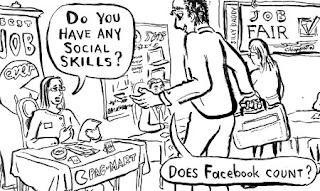Due to the large impact that social technology has on face-to-face social skills, the technology that was created to bring us together is actually pulling us further apart than we have ever been before. We are currently enveloped by the addictiveness of social media and other social technologies. Unless we limit ourselves in the time that we spend on Facebook, Skype, Instagram, and other social media applications and websites, they will overtake our way of life and completely destroy our abilities to read, respond, and connect to each other in face-to-face situations. By limiting ourselves, we can start to make real connections with other individuals.
An easy way to help prevent that future is to take a few days with others in a technology-free environment. Situations that could be taken advantage of to have a technology-free environment include going on a vacation, to summer camp, and camping. If people were to take time off to do so, we could minimize the damage that social technology is causing on the Millennials and the generations that are to come.
Works Cited:
Baskin, Steve. "Unplugging Our Kids: Steve Baskin at TEDxSanAntonio." YouTube. YouTube, 23 Jan. 2013. Web. 07 Dec. 2015.
Bindley, Katherine. "When Children Text All Day, What Happens To Their Social Skills?" The Huffington Post. TheHuffingtonPost.com. Web. 7 Dec. 2015.
Imam, Jareen. "The Anti-social Network: Life without Facebook - CNN.com." CNN. Cable News Network. Web. 8 Dec. 2015.
Johnson, Chandra. "Face Time vs. Screen Time: The Technological Impact on Communication." Face Time vs. Screen Time: The Technological Impact on Communication. Web. 7 Dec. 2015.
Works Cited:
Baskin, Steve. "Unplugging Our Kids: Steve Baskin at TEDxSanAntonio." YouTube. YouTube, 23 Jan. 2013. Web. 07 Dec. 2015.
Bindley, Katherine. "When Children Text All Day, What Happens To Their Social Skills?" The Huffington Post. TheHuffingtonPost.com. Web. 7 Dec. 2015.
Imam, Jareen. "The Anti-social Network: Life without Facebook - CNN.com." CNN. Cable News Network. Web. 8 Dec. 2015.
Johnson, Chandra. "Face Time vs. Screen Time: The Technological Impact on Communication." Face Time vs. Screen Time: The Technological Impact on Communication. Web. 7 Dec. 2015.





